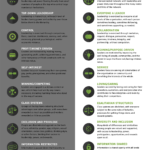Personal branding has been a thing now for over a decade, yet too many people still feel invisible where they work. How can that be with a wash of social feeds broadcasting us 24/7? Before social media, people had personal brands and called them “professional reputations.” I think it’s because many people now think of building their reputations strictly in social media terms. This is a mistake that can leave them with no actual reputation in their companies. So here are some old fashioned, but highly useful, personal branding tips for the modern age.
In many ways, now is the perfect time to focus on building your personal brand reputation outside of social media since organizations are evolving to make it easier than ever to succeed without positional power and authority. I recently came across the infographic below which demonstrates many ways in which organizations are becoming more networked, less hierarchical and more driven by purpose. Click on the infographic below to learn more about modern organizational leadership cultures from BK Publishing:
In a more modern organization, it can be easier to align your personal brand with success, but you still need to be intentional if you’re going to end up with the reputation you want. And if your organization is still at the primitive end of the evolutionary scale, you’ll have to work harder to stand out as an evolved employee.
Personal brand tips inside organizations
There are two primary reasons to intentionally build your personal brand reputation where you work today: new opportunities and building relationships that can pay off in the future – even at other companies.
At my first professional job out of graduate school, I worked with someone who I stayed in touch with even when I left that job. When I was ready to change careers about ten years later he knew my work and knew my reputation in the industry. That gave him the faith in me he needed to convince his company to hire me into a job I wasn’t technically qualified for due to lack of direct experience. I did a good job there and a few years later when he moved to a new company, he put in a good word for me again and I took another step forward in my new career field.
Your personal brand is social, but it’s not just on social media – Click to Tweet
Here are the key things I did and I’ve seen my clients do to quickly establish a good reputation inside an organization that pays off in both predictable and unpredictable ways.
- Do good work
- Know your group’s business objectives and know how to prioritize your work in ways that support those objectives
- Teach success – when you have small and big successes, explain the lessons you learned to others
- Be genuinely friendly – make people smile
- Always share information that can help others
- Find out who has influence in your group and help them succeed
- Find out who has influence in adjacent groups and help them succeed
- Know what about your job/the organization gives you purpose and talk about it to others inside and outside the office
- Let people know your personal and professional goals so they can help you achieve them
- Share your ideas and build on them in collaboration with others, giving credit where credit is due
Personal brand tips on social media
It’s easy to think of your in-person reputation as different than your social media brand, but they’re inextricably linked in the eyes of people who experience you in both places. In this cross-over community, you have the greatest opportunity to make a strong impression, the kind that will follow you and help you far into the future. Here are some things you can do to build a strong brand on social media that can reinforce and strengthen your in-person reputation.
- Make sure your professional profiles are up to date on LinkedIn and on your company’s social sites
- If your company has a LInkedIn Group, join it and post at least once a quarter, comment on other’s posts at least once a month
- Make sure to connect and follow your colleagues, boss and other senior leaders in the company on LinkedIn and company social sites
- Choose an area of expertise you want to be known for and post an interesting article – including a sentence or two about why you think it’s interesting – at least once a month on both your LinkedIn and company sites
- If you belong to a professional association, follow their posts on LinkedIn and share their news on your feed and/or in your company’s social site
Image by PublicDomainPictures from Pixabay
Personal brand traps to avoid
Of course, there can be downsides to the very small worlds that social and real life can become in your workplace. Just as a well-curated professional brand can create career opportunities, it can hurt you if you’re not paying attention. Be intentional about it!
-
- Be thoughtful about who you include in both your personal and professional circles
- Understand the difference between your personal and professional brands and interests – have one of each and be proud of (and engaged in) both of them
- Choose different social media to post different kinds of things on and be thoughtful about cross posting
- Recognize that anything you say and do in personal and professional circles can become more broadly known and become mindful about what you do and why
Even if you’re thoughtful about the brand reputation you’re creating, there comes a time when you need to get feedback to understand how you appear to others. Wonder what they think? Just ask! Be open to learning something from whatever they say. [Feel triggered? Get over it so it doesn’t stop you from improving yourself.\
My final tip to avoid becoming invisible is: don’t wait until you’re looking for a job to become intentional about your personal brand. Too many people fail to update their LinkedIn and start applying for jobs before it’s too late. They worry that their boss will assume they’re looking for a job anytime they’re active on LinkedIn. Here’s the problem with this silent approach: if you only get social, network and share information when you’re looking for a job then you may well be tipping off your boss that you’re on the job market.
Conversely, if your online presence is consistent with your in-person brand, if you’re sharing information and teaching success in personal and online venues all the time, no one will notice when your personal motivation shifts from “brand building” to “job searching”. And actually, in the brand building phase, you’ll be more likely to attract new opportunities in person and online, giving you an ongoing sense of your value and options to leave before you’re miserable. Do it right and maybe you won’t even have to look for a new job. It just might find you!








